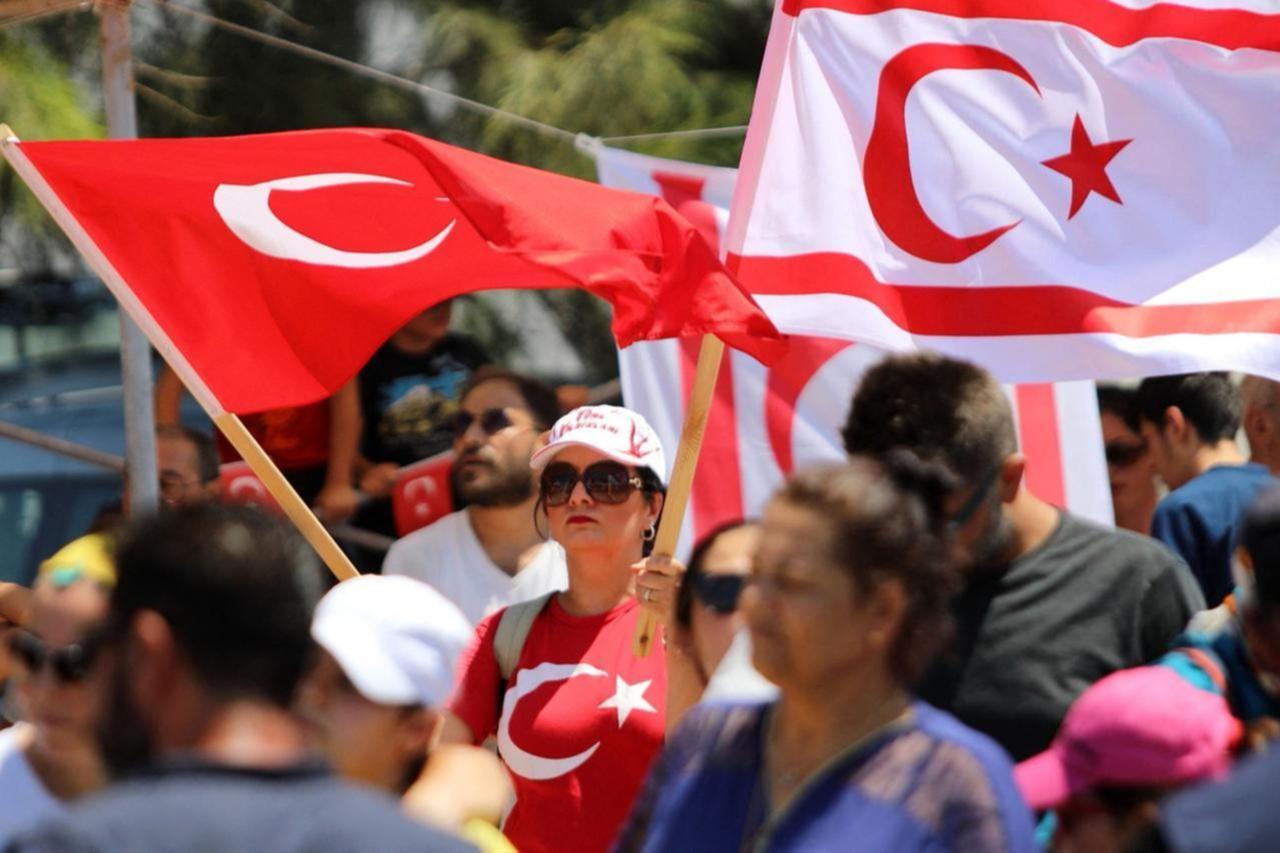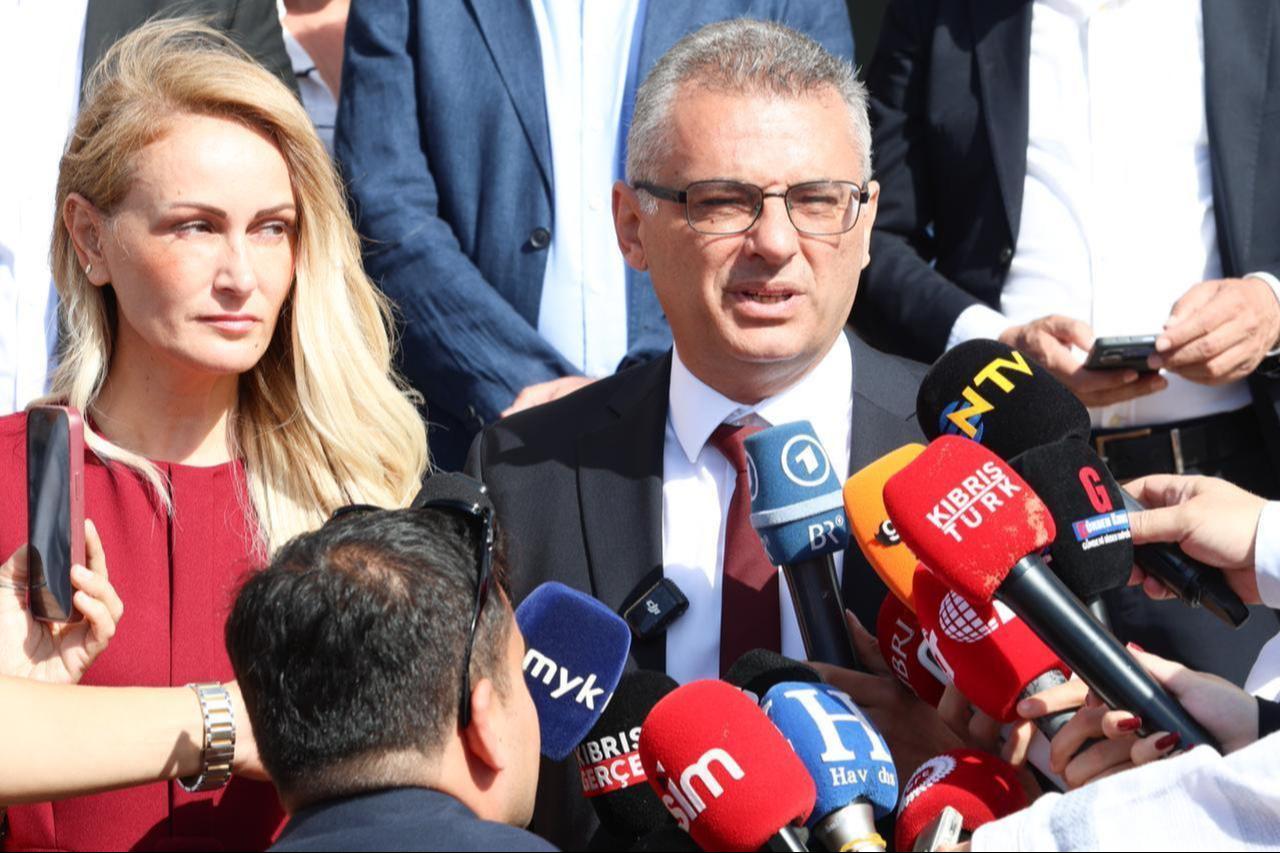
In a surprise upset, Turkish Cypriot opposition leader Tufan Erhurman won the first round of the presidential elections in the Turkish Republic of Northern Cyprus (TRNC) against the incumbent Ersin Tatar on Oct. 19. Despite expectations, the new Turkish Cypriot president is unlikely to bring a radical shift in Ankara-TRNC ties or the Cyprus question in the near term.
Erhurman secured 62.76% of the vote over Tatar, seen as Türkiye’s favored candidate, who gained only 35.76%. Tatar called for a two-state solution in Cyprus, one that comported with Ankara’s position for global recognition and ending the isolation of TRNC, which is only recognized by Türkiye. Erhurman advocates for reunification under a bizonal, bicommunal federation with the Greek Cypriot-dominated Republic of Cyprus, which Türkiye calls the “Southern Cyprus Greek Administration.”
During his campaign, Erhurman signaled that he did not want to keep Türkiye at arm’s length—a point he repeated to Anadolu Agency on the night of his victory: “No (Turkish Cypriot) president ever negotiated or held a meeting (with Greek Cypriots) or set foreign policy without coordinating with Türkiye. That is our state tradition. Relations with the Republic of Türkiye are tremendously important and vital for us and will continue to be so during my term. It will be my mission to develop relations with Türkiye.”
After all, the Turkish Cypriot president said, he had worked with Türkiye as TRNC prime minister in 2018-19 and later as leader of the main opposition.
Initial reactions from Ankara officialdom to Erhurman’s victory appeared calm and receptive. In a post on X, President Recep Tayyip Erdogan congratulated him: “I hope that these elections, which once again showed the democratic maturity of the TRNC and reflected the will of our Turkish Cypriot siblings at the ballot box, augur auspicious things for our countries and our region.”
Foreign Minister Hakan Fidan echoed Erdogan: “As the motherland and guarantor, Türkiye will continue advocating for the righteous cause of Turkish Cypriots.” The Turkish chief diplomat also underlined that the “only realistic solution (to the Cyprus question) is accepting that two separate states exist on the island.”
Meanwhile, several nationalist commentators in the mainland called the result on the island “the fall of the Taurus (mountains),” a reference to “Toros,” the codename of Turkish Cypriots’ legendary leader (and later founding president of TRNC), the late Rauf Denktas, during his days of struggle against Greek and Greek Cypriot oppression of Turkish Cypriots. Another Turkish geopolitical expert who focuses on Cypriot affairs called Erhurman “a more dangerous figure” than the previous pro-reunification president, Mustafa Akinci, because Erhurman is a more “able politician.”
Meanwhile, the main opposition Republican People’s Party (CHP) Chairman Ozgur Ozel made the TRNC elections all about Türkiye's internal politics and claimed that Turkish Cypriots rejected Ankara's allegedly overbearing attitude toward the island.
There are several reasons why Türkiye and the TRNC’s new leadership are unlikely to fall out.
For one, although Türkiye plays a prominent role in TRNC affairs—due to a Greek Cypriot embargo, the Turkish Cypriot republic relies on the Turkish economy for trade and investment—over the years, successive governments in Ankara have left plenty of space for Turkish Cypriots to run their own affairs.
The TRNC’s own creation in November 1983 happened right as Türkiye was retiring its military regime and transitioning back to multiparty democracy. The impetus for Turkish Cypriot independence came not from Ankara but from Denktas, who became the TRNC’s first president after independence. Türkiye-TRNC ties are often a “tail wags dog” story.
Similarly, it was not until negotiations with the Greek Cypriots in the Swiss town of Crans-Montana broke down in 2017 that Turkish Cypriot opponents of then-TRNC President Mustafa Akinci, a pro-reunification figure, began calling for a two-state solution on the island. Only then did the Erdogan administration begin voicing the two-state position more loudly.
Indeed, Erhurman’s hands might be tied already—by his own legislature. On Oct. 14, the Turkish Cypriot parliament passed a resolution that calls for a two-state solution to the Cyprus question: The resolution read in part, “Because of the uncompromising attitude of the Greek (Cypriot) side, no consent will be given to the exhausted search for a federal solution through word games or to halt the process that aims to increase the international visibility and recognition of the Turkish Republic of Northern Cyprus. As the legitimate representative of the Turkish Cypriot people, the Republican Assembly of the Turkish Republic of Northern Cyprus supports the policy of a ‘two-state’ solution.”

Second, Erdogan, always a consummate politician, has perfected the art of keeping his options open in foreign affairs. During his first term in office as prime minister in the 2000s, Erdogan supported the reunification of the two sides in Cyprus to make progress on Ankara’s EU candidacy and lessen foreign policy tensions when the U.S. occupation of Iraq was hurting Ankara-Washington ties.
At a time when Türkiye’s geopolitical interests have begun to align with the EU over the Russian war in Ukraine and a potential scaling down of U.S. security commitments to NATO, Ankara is unlikely to challenge Erhürman’s attempts to reconcile with Greek Cypriots.
Third, while Turkish Cypriots sway between a two-state solution and reunification with the south, an overwhelming majority—some 85.5%—want Turkish troops to stay on the island and for Türkiye to maintain its role as guarantor even after the Cyprus question is resolved, according to public opinion polls.
At present, Ankara is estimated to maintain a powerful army corps of some 40,000 troops, a number that might go up due to the deployment of Israeli military hardware to Greek Cyprus and Greece and a potential escalation of tensions in the eastern Mediterranean in the future.
Fourth, Erhurman’s presidency might end up looking like that of Akinci, who also supported reunification but could not convince his Greek Cypriot counterpart, Nicos Anastasiades, to accede to the bare minimum of Turkish Cypriot demands: Treating Turkish Cypriots as equals, functional autonomy for the north, unalterable security guarantees that would involve keeping a small Turkish military contingent on the island, and no major changes to the constitutional order without Turkish Cypriot consent.
The current Greek Cypriot president, Nikos Christodoulides, was Anastasiades’s foreign minister, and there is no indication that he could meet Turkish Cypriot expectations.
So, why care about any of this? Cyprus makes more headlines today than it would have in the past for several reasons.
Following Türkiye’s intervention in 1974 to prevent a Greek-backed coup to annex the island to Greece, Cyprus has been divided between the TRNC and the Greek Cypriot south. Since then, reunification talks have gone nowhere. In 2004, Turkish Cypriots approved by 65% and rejected by Greek Cypriots rejected by 76% the U.N.-sponsored referendum 2004 drafted by then Secretary-General Kofi Annan.
Instead of lifting sanctions on the TRNC, however, the so-called international community and the Europeans kept Turkish Cypriots isolated while awarding the Greek Cypriots with full EU membership.
Then came the discovery of natural gas deposits in the eastern Mediterranean in the early 2010s that further bolstered the island’s geopolitical importance, although commercial production in areas claimed by Greek Cyprus has yet to start.
In the mid-2010s, many observers had hoped that the proceeds from the gas extraction could foster better dialogue between the two sides on the island, but it has only worsened divisions—also escalating tensions between NATO allies Türkiye and Greece, both of which are looking to secure eastern Mediterranean hydrocarbons for themselves.
The Ottoman Empire acquired the island from Venice in 1571, which remained under Turkish control until 1878, when the United Kingdom took over, keeping it under colonial administration until the independence of the Republic of Cyprus in 1960.
Amid Greek desire for “enosis” (union with Greece) and Turkish desire for “taksim” (separation), the bicommunal constitutional system quickly broke down. A coup backed by the colonels’ junta in Athens in 1974 led Türkiye to invoke its role as guarantor under the London-Zurich Accords of 1959, which led to the division of the island to this day.